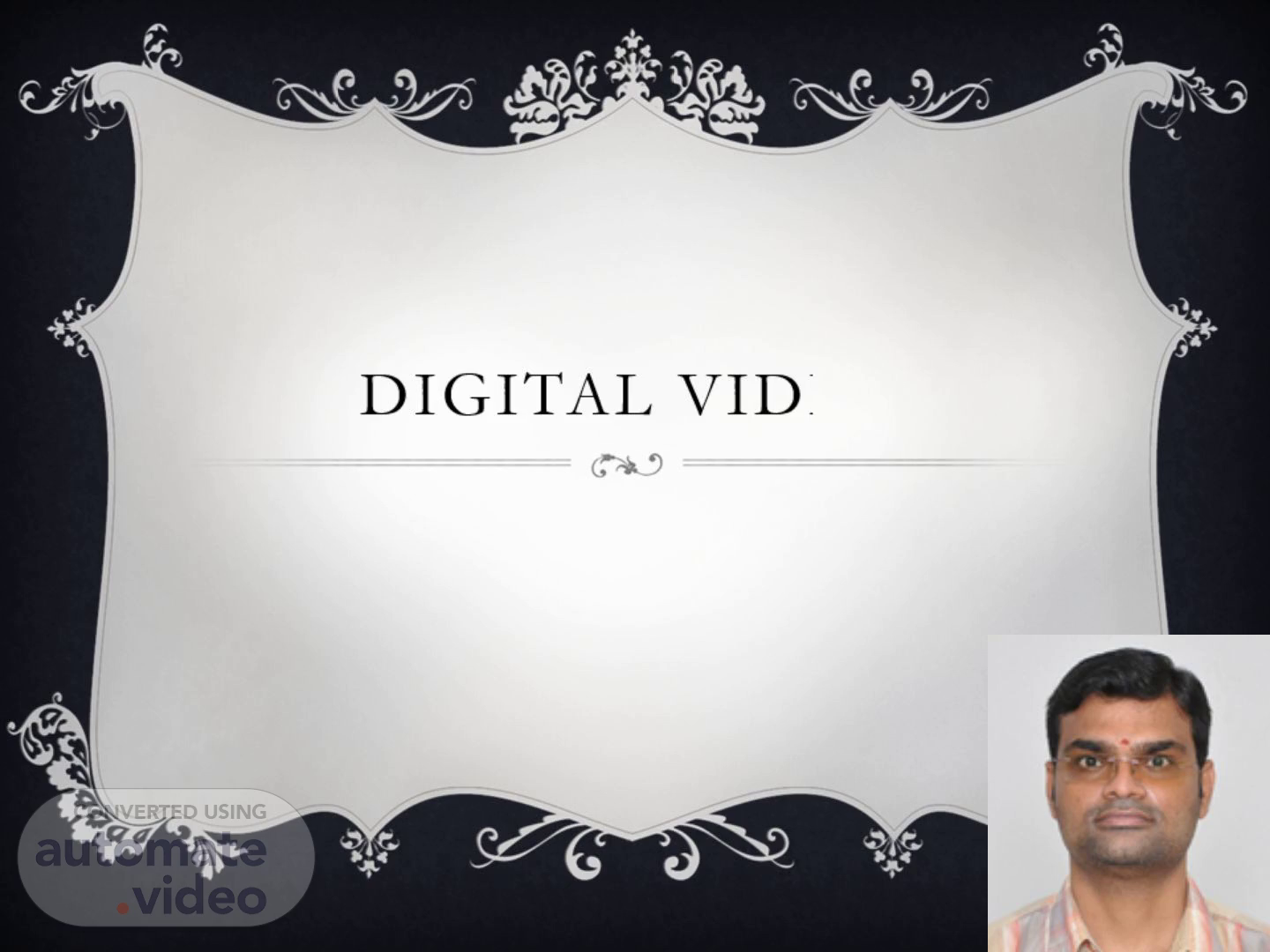Page 1 (0s)
DIGITAL video.
Page 2 (6s)
Outline. Consider the implications of using digital video in multimedia Discuss video analog and digital technologies and displays Work with digital video containers and codecs to select the best video recording formats for multimedia projects Find and acquire video clips Shoot and edit video for use in multimedia.
Page 3 (21s)
video. Of all the multimedia elements, video places the highest performance demand on your computer or device—and its memory and storage..
Page 4 (31s)
When light reflected from an object passes through a video camera lens, that light is converted into an electronic signal by a special sensor called a charge-coupled device (CCD).
Page 5 (46s)
Analog video has a resolution measured in the number of horizontal scan lines (due to the nature of early cathode-tube cameras)..
Page 6 (58s)
Component: Separates the Red, Green, Blue channels on different CCDs as separate signals on its own conductor. Component is used for high quality video..
Page 7 (1m 10s)
S-Video: (Separate Video) uses two channels: Luminance: sometimes referred as Y (greyscale). Chrominance: sometimes referred as C (color).
Page 8 (1m 25s)
Composite: when all the signals are mixed together and carried on a single cable as a composite of the three color channels and the sync signal. The composite signal yields less-precise color definition..
Page 9 (1m 41s)
A single video frame is made up of two fields that are interlaced. Tracking is the fine adjustment of the tape during playback so that the tracks are properly aligned as the tape moves across the playback head..
Page 10 (1m 56s)
NTSC. Analog Broadcast Standards. National Television Standards Committee a single frame of video was made up of 525 horizontal scan lines drawn onto the inside face of a phosphor-coated picture tube every 1/30th of a second by a fast-moving electron beam. Odd lines than even lines (60 lines per second= 60Hz).
Page 11 (2m 13s)
Flickering.
Page 12 (2m 26s)
PAL. Analog broadcast standards. Phase Alternate Line (PAL) increased the screen resolution to 625 horizontal lines, but slowed the scan rate to 25 frames per second. 50 lines per second = 50Hz.
Page 13 (2m 39s)
SECAM. Analog broadcast standards. Sequential Color and Memory (SECAM) a 625-line, 50 Hz system. SECAM transmits only one color at a time, it is free of the color artifacts present in NTSC and PAL resulting from the combined transmission of both signals..
Page 14 (2m 54s)
Analog broadcast standards. O NTSC O SECAM PAL or PAL/SECAM O no info.
Page 15 (3m 1s)
Digital video. [image] rape Travel Insert and Track Information 8mm Digital Videotape Subcode Data 4—Video Data Audio Data 4/ 4/ 4/ 4/ 4/4/4/ 4/ 4/ 4/ 4/.
Page 16 (3m 14s)
hdtv. HDTV provides high resolution in a 16:9 aspect ratio. The broadcast industry promulgated an ultra-high-resolution, 1920 × 1080 interlaced format (1080i). BUT the computer industry wanted a 1280 × 720 progressive-scan system (720p) for HDTV. Both formats have been included in the HDTV standard by the Advanced Television Systems Committee (ATSC)..
Page 17 (3m 31s)
Displays.
Page 18 (3m 37s)
displays. cathode ray tube (CRT): Colored phosphors screen glow red, green, or blue when they are energized by an electron beam..
Page 19 (3m 50s)
degaussing.
Page 20 (3m 59s)
Flat screen. Liquid-crystal display (LCD) is a flat panel display, electronic visual display, or video display that uses the light modulating properties of liquid crystals. Liquid crystals do not emit light directly. Plasma: the technology utilizes small cells containing electrically charged ionized gases, or what are in essence chambers more commonly known as fluorescent lamps..
Page 21 (4m 17s)
interlacing.
Page 22 (4m 29s)
comparison. Interlaced Scanning A frame is made up Of two fields. Progressive Scanning A frame is made up of one field..
Page 23 (4m 38s)
OVerscan/ underscan. Action safe area (93.4% W x 93% H) Title safe area (86.6% W x H) 4:3 Aspect Ratio Action safe area (93% W x 93% H) itle safe area (80% W x 90% H) 16:9 Aspect Ratio.
Page 24 (4m 51s)
MPEG. MPEG-1 MPEG-2 MPEG-4 1.2 Mbps of video 250 Kbps of two-channel stereo audio using CD-ROM technology. higher data rates (3 to 15 Mbps). higher image resolution. multiresolution scalability. Standard for Digital TV and DVDs. It offers indexing, hyperlinking, querying, browsing, uploading, downloading. Virtual Reality.
Page 25 (5m 9s)
Shooting and editing video. Fast processor(s) Plenty of RAM Computer with FireWire (IEEE 1394 or i.Link) or USB connection and cables Fast and big hard disk(s) A second display to allow for more real estate for your editing software External speakers Nonlinear editing (NLE) software.
Page 26 (5m 24s)
Shooting platform. 6 Shooting Tips for the Holidays Stabilize If you move the camera, do it smoothly- Insert shots Hone in on the details — food, gifts, or tamily photos. Establishing shots Ground the setting with wide Shots ot the scenery. Action shots Catch some movement — cooking, dancing, or the kids. Natural reactions Capture smiles, laughs, and conversation between trjendS and tamilY. P.O.V. shots Show us the scene from your point ot view!.
Page 27 (5m 45s)
storyboard. Lory storyboard Close up . SHEET 1.
Page 28 (5m 52s)
Chroma key. Chroma keys allow you to choose a color or range of colors that become transparent, allowing the video image to be seen “through” the computer image..
Page 29 (6m 6s)
White balance.
Page 30 (6m 15s)
Linear editing.
Page 31 (6m 29s)
Non linear editing.
